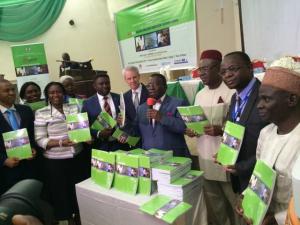Nigeria launches the 2015 National Malaria Indicator Survey
Abuja, 08 November 2016 - The Honourable Minister of Health, Professor Isaac Adewole launched the National Malaria Indicator Survey (MIS) 2015 report in Abuja on 7 November, 2016. The survey was conducted by National Malaria Elimination Programme (NMEP) in collaboration with National Population Council and National Bureau of Statistics, with technical support from ICF international, US Presidents Malaria Initiative, WHO and UKAid.
This is a the second MIS conducted in Nigeria and it provides information on malaria prevalence and other key indicators for the national level and each of the country’s 36 states plus the Federal Capital Territory.
Delivering the keynote address at the launch, Professor Adewole, noted that the report demonstrates important incremental achievements efforts across all areas of malaria control that has culminated into significant reduction of malaria prevalence from 35% to 27%. He thanked all present for their continued efforts that have so far yielded the observed reduction of malaria prevalence.
The minister observed that over 90 million Long Lasting Insecticides Treated Nets (LLINs) have to date been distributed through campaigns. He stated that though the survey shows that utilization had improved; “it remains relatively suboptimal considering the level of investments made”. He therefore appealed to all present to be ambassadors for change by making sure that they themselves sleep under a net. “You should all sleep under a net tonight. If you don’t have a net, please see the national coordinator to get one”.
In his intervention at the event, the acting WHO Representative in Nigeria, Dr Rex Mpazanje highlighted the 2015 global report showed notable malaria prevalence reductions in a number of African Region countries including a marginal decline in Nigeria. He indicated that declining in malaria prevalence observed for Nigeria was however fragile. “Indeed, the 2015 WHO global estimates showed that Nigeria accounted for more than a quarter of the global burden of malaria”, he revealed.
The acting WR therefore called for accelerated actions towards ensuring that all at risk women and children sleep under a net and can easily access quality malaria treatment whenever it is needed in line World Health Assembly commitments outlined in the Global Technical Strategy of 2016-2030.
In their separate speeches, the USAID Mission Director for Nigeria, representative of DFID head of mission and Global Fund malaria portfolio manager pointed out the significant resources that have been channelled by funding agencies towards Malaria control. They emphasized success recorded so far and assured the Honourable Minister of Health of their continued support in ensuring sustained lifesaving commodities for malaria prevention and control while calling for need for government’s increased funding.
Although malaria is preventable, treatable and curable, it is endemic in Nigeria and remains the number one public health problem, with its greatest toll on children under age 5 and pregnant women. Records show that Africa still bears over 80% of the global malaria burden of which Nigeria accounts for about 29 percent. Together with the Democratic Republic of Congo (DRC), Nigeria contributes up to 40 percent of the global burden (World Malaria Report, 2014). It is estimated that about 110 million clinically diagnosed cases of malaria and nearly 300,000 malaria related childhood deaths occur each year.
__________________________________________
For more information, please contact:
Technical contact:
Dr Lynda Ozor; Tel: +234 803 402 0832; Email: ozorl [at] who.int (ozorl[at]who[dot]int)
Media contacts:
Ms Charity Warigon; Tel: +234 810 221 0093; Email: warigonc [at] who.int (warigonc[at]who[dot]int)



